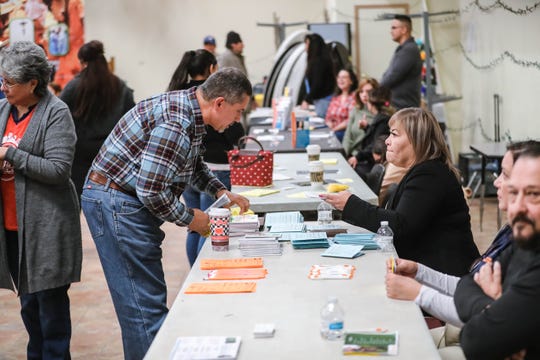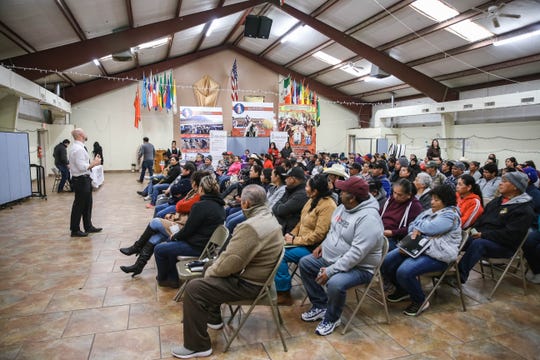[ad_1]
 Purchase Picture
Purchase Picture
Cesar Gómez sits on his mom’s lap at a migrant farmer useful resource honest in Hatch on Friday, Feb. 21, 2020. (Picture: Nathan J Fish/Solar-Information)
HATCH – A dozen organizations held an annual useful resource honest at Our Lord of Mercy Catholic Church in Hatch Friday morning that was aimed toward serving to native migrant farmworkers and their households with profession companies, medical therapy, authorized support and situations of wage theft.
The occasion was spearheaded by the New Mexico Division of Workforce Options however included quite a few third celebration teams providing assets to about 150 attendees of all ages. Because of considerations that immigration authorities may’ve used the occasion to arrest undocumented immigrants, promoting was performed largely via phrase of mouth.
The same occasion in Deming drew nearly 200 folks final week, some Workforce Options employees mentioned.
Bea Krueger, a staffer from Workforce Options who oversaw the occasion, mentioned the occasion is usually held on the church yearly. She’s been with the division for the reason that annual occasion began nearly 20 years in the past.
Keep knowledgeable on New Mexico’s information. Subscribe to the Las Cruces Sun-News.
Krueger said she has seen a shift toward pursuing education, as farmworkers realize they want to branch off toward jobs that pay better.
“What we’ve been finding out is the younger generation is not going in the fields anymore,” Krueger said. “We provide services so they can go to college, and so a lot of the generations are now going to college.”
Tables offered job training programs with wages that are subsidized and tuition assistance programs for low-income students going back to school or going for the first time.
New Mexico State University offered information about its College Assistance Migrant Program, a federally-funded scholarship program to help migrants or seasonal farmworkers attend college.
For migrant farmworkers who want to improve their situation, getting a college degree or vocational training is crucial. For many, their parents were also farmworkers.
Data from the National Center for Farmworker Health showed most U.S. farmworkers are foreign-born and only about 11 percent have completed some form of higher education.
The event featured career resources to help connect Spanish speakers with English as a Second Language programs, high school diploma equivalency programs, résumé training, interview tips and cover letter help.
 Buy Photo
Buy Photo
Dozens of people attend a migrant farmer resource fair in Hatch on Friday, Feb. 21, 2020. (Photo: Nathan J Fish/Sun-News)
Immigration status help
As the Trump administration has cracked down on illegal immigration and undocumented workers in the last few years, Krueger said the event has also offered information on immigration law for farmworkers.
“We try to inform (the migrant workers) about changes that are coming up (related to border policy and residency) and for them to get educated,” Krueger said.
One table sponsored by the Catholic Charities of Southern New Mexico featured legal advice for attendees.
Attendees had the opportunity to sign up to receive a phone consultation about their specific legal question or issue. Immigration attorney Imelda Maynard said, because they’re dealing with a population that tends to be lower-income, Catholic Charities offers cheaper legal advice than what they’d get at a normal firm.
Maynard said Catholic Charities provides deportation defense services, legal permanent residency help, naturalization services and visa help.
“We get asked a lot of personal questions about how people in their circumstances, how they can fix (it),” Maynard said.
When undocumented immigrants ask Maynard what to do about their situation, she said it’s complicated.
“We have to do an individualized consultation with them. The question is complex because I have to ask a number of different other questions to find out, okay, which pathway do I see for you, if there even is one,” Maynard said.
Data has shown nearly half of U.S. farmworkers are undocumented.
Wage justice resources
The Workforce Solutions Department had a table which offered assistance for farmworkers and workers in other professions — like hospitality and food service — with instances of suspected wage theft.
Raymond Jojola, the bureau chief for Workforce Solutions’ Labor Industrial Bureau, said wage theft can occur when employers aren’t educated on wage laws and workers don’t know how much they should be making.
“We’re trying to be more strategic in training employers of what the wage laws are,” Jojola said. “In most cases, they don’t do it maliciously.”
Attendees could file a claim to report suspected wage theft at the table. The state bureau would then investigate to see if overtime, minimum wage or other labor laws have been violated.
More: Bill aims to boost New Mexico’s farm labor supply and give some immigrants legal status
It’s important for farmworkers to know they can report wage theft. The 2018 report from the NCFH says farmworkers are among the most economically disadvantaged in the country. Their work usually doesn’t get them any benefits or worker’s compensation.
 Buy Photo
Buy Photo
Dozens of people attend a migrant farmer resource fair in Hatch on Friday, Feb. 21, 2020. (Photo: Nathan J Fish/Sun-News)
Low-cost health care
There were also health care services for farmworkers at the event. A staff member from the local Ben Archer Health Center of Hatch checked attendees’ blood pressure and tested them for diabetes for free.
Representatives from Amador Health Center in Las Cruces gave attendees information on the numerous health services the clinic offers, regardless of insurance or legal status. The center is able to offer a sliding scale of fees depending on income.
Jesus Ramirez, a case manager at Amador, said the center offers clinical and behavioral health services like assistance applying for Medicaid and counseling and education for substance abuse.
Nearly 30 percent of U.S. farmworkers live in poverty and many don’t get health benefits with their jobs. Paired with language barriers and lack of transportation, many have trouble accessing adequate care.
Michael McDevitt can be reached at 575-202-3205, [email protected] or @MikeMcDTweets on Twitter.
Preserve studying:
Learn or Share this story: https://www.lcsun-news.com/story/information/2020/02/22/hatch-migrant-fair-offers-education-and-legal-aid/4835419002/
[ad_2]
Source link






